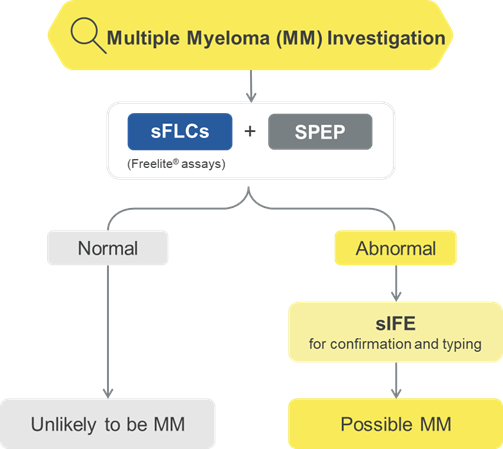Can Serum Free Light Chain Testing replace Urine Protein Electrophoresis in Multiple Myeloma Investigations?
Did you know that studies show:
- Up to 95% of patients do not provide a 24-hour urine sample when a 24-hour urine Bence Jones Protein test (i.e. Free Light chains in urine) is requested, leading to delays in Multiple Myeloma diagnosis
- Patients can develop clinical complications when diagnosis of Multiple Myeloma is delayed
Dr Wei Hong Tay explains
Download this summary of publications to find out why you should order sFLC over UPE when investigating for Multiple Myeloma:
What are the challenges with providing 24-hour urine samples?
Patients are asked to collect and store urine samples in large 3-liter bottles over a 24-hour period. The process of having to manage these large collection bottles is cumbersome and the challenge deters many patients from providing the sample to the laboratory for testing.
Studies show that compliance for 24-hour urine sample collections to investigate Bence Jones Proteins can be as little as < 5%. This means in more than 95% of cases there may not be a sample to analyse.
Even with active follow-up for up to 90 days from receipt of a blood sample, only 52% of patients provided the requested 24-hour urine sample.
What is the impact of not providing a 24-hour urine sample?
When the laboratory does not receive a 24-hour urine sample for a Bence Jones Protein test request (Free Light Chains in urine), this can lead to delays in the diagnosis of Multiple Myeloma patients.
Delay in diagnosis and subsequent management of Multiple Myeloma can lead to complications that impact on patients’ quality of life.
Kariyawasan et al. showed how clinical complications start to manifest when diagnosis is delayed, with 100% of patients developing clinical complications when diagnosis is delayed longer than six months.
To help avoid diagnostic delays, request serum Free Light Chain testing over urine Protein Electrophoresis in Multiple Myeloma investigations
Requesting serum Free Light Chain (sFLC) testing over urine Protein Electrophoresis (UPE) avoids sample provision challenges associated with 24-hour urine samples.
This is why requesting sFLC testing over UPE in Multiple Myeloma investigations is supported by established guidelines.
The guidelines from the International Myeloma Working Group (IMWG) recommend SPEP alongside serum sFLC testing for initial investigations.
The 2016 UK NICE guidelines elaborate further by stating “…urine testing was only done in a fraction of the people being tested. This could have resulted in potential missed diagnoses if the serum free light chain assay was not performed…”.
A more recent study by Sanfeld-Paulsen et al. investigated patients from general practice where prevalence of MM is expected to be low, to evaluate whether the use of sFLC ratio (measured using Freelite® assays) improved diagnosis when combined with serum Protein Electrophoresis (SPEP). The study focused on whether the sFLC ratio could supersede UPE and how different sFLC ratio cut-offs affect the diagnostic values.
The study concluded that:
“[…] our findings support that the sFLC ratio can replace UPE when patients are suspected of myeloma in general practice.”
“[…] the replacement of UPE with sFLC ratio will probably result in improved overall detection of positive cases due to the low compliance generally obtained for urine UPE.”

Adapted from:
Myeloma: Diagnosis and management. NICE Guidelines 2016
Hear Dr Natsuhara's opinion on this topic:
Download this summary of publications to find out why you should order sFLC over UPE when investigating for Multiple Myeloma, fill out the form below:
Thank you!
“Product availability is subject to country specific regulatory requirements. Contact your local representative for availability in your country.”
Not for use in China.



